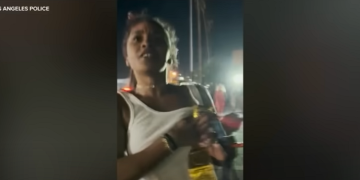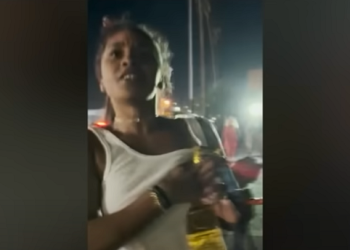
NFL linebacker Dwight Freeney said Tuesday he is suing Bank of America for $20 million because he was the victim of an alleged scheme that caused him to shutter his Hollywood eatery, Rolling Stone L.A.
Freeney and his company, Roof Group LLC, sued Bank of America and its vice president Michael J. Bock, on Feb. 23 in Los Angeles Superior Court. In a news conference today, he said he trusted one of the nation’s largest financial institutions.
“I’d heard some really good things about this bank,” Freeney said outside the downtown County Courthouse. “I trusted them to do what was right and they ended up ripping me off.”
Bank of America spokesman Bill Halldin issued a statement in response to Freeney’s allegations.
“Although we sympathize with Mr. Freeney as the victim of a crime, the bank had nothing to do with the criminal scheme,” the statement reads. “The two people responsible for this wrongdoing have already been convicted. The primary wrongdoer never worked for the bank or any of its affiliates.”
The 35-year-old Freeney is a free agent linebacker who played for the Indianapolis Colts and the San Diego Chargers. His lawsuit states that while at the pinnacle of his NFL career and after having played in his second Super Bowl, Freeney “made the fateful decision” to entrust management of his finances to Band of America’s Global Wealth & Investment Management Division.
“Over the next two years, Mr. Freeney became the victim of an elaborate and malevolent scheme to defraud,” the suit alleges.
Freeney’s advisers included Bock and Michael Stern, described in the lawsuit as “a notorious financial predator” who stated he was wealthy but actually was in bankruptcy, the suit alleges.
In 2010 and 2011, $9 million of Freeney’s money was transferred into a Bank of America account without the athlete’s knowledge, according to the suit, which alleges that about $2.2 million was wired to Stern’s front company.
Freeney says his restaurant closed in 2013 due to the financial instability allegedly created by his advisers. He said he had seen other athletes have money problems after their careers were over and that he had hoped to avoid the same pitfall when he retired.
“Definitely being ripped off is horrible,” Freeney said. “For them to steal money from me and make it seem like it’s all right, it’s not all right.”
Freeney’s lawyer, Jeff Isaacs, called Bank of America’s alleged actions a “shocking case of corporate irresponsibility.” He claimed the financial institution has not been helpful in trying to resolve the dispute.
“Mr. Freeney was ripped off, and that wouldn’t have happened but for Bank of America,” Isaacs alleged. “It’s been a frustrating experience.”





















